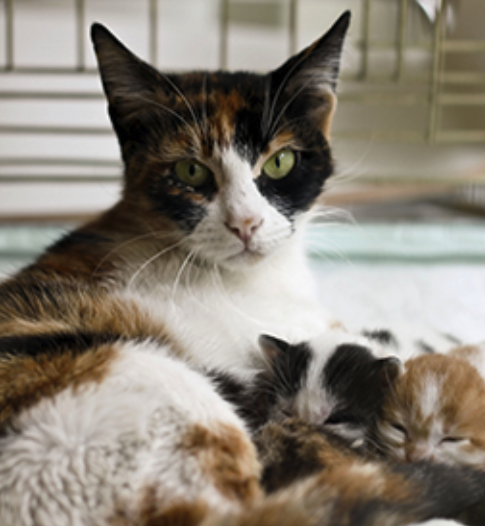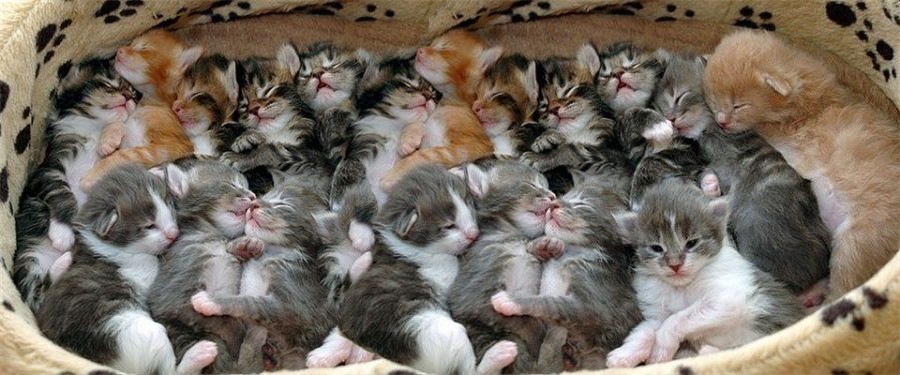There is no well-defined rule regarding the size of your kitten's litter.

Most unspayed female cats (queens) give birth to three to five cute kittens.
However, the size of a litter may vary from just one baby to more than ten.
That means that you can expect a different number of kittens depending on influential factors such as the size of the mother cat and her breed.
Also, you need to consider external factors, including the health of your cat and the environment.
Let's talk about it in more detail.
How Many Kittens Can Your Cat Have?
The statistics say that healthy, average-sized indoor cats may give birth up to five kittens per litter. While they are young, their offspring will be more numerous. Over time, that number may be reduced, and you can probably expect three babies per litter.
The fascinating thing is that your cat may give birth to kittens coming from different fathers. It is not rare at all, especially when your cat goes out freely and mates with more toms during a heat cycle. Every act of breeding will cause ovulation, and your cat may produce eggs a few times during only one heat cycle.
Commonly, feral moms seldom have more than three or four babies. The reason is a quite stressful pregnancy and the fact that these cats are usually malnourish.
As for cats living in the home, the crucial factor is how often you let them go out freely. When you don't pay enough attention to her behavior during a heat cycle, you may face the new pregnancy of your furry friend every three months.
Factors That Influence the Size of the Litter
As I have already mentioned, many different factors will affect the size of your cat's litter, including:
How old your queen is - On average, older cats have smaller litters. Also, you may expect just one to three kittens in the first litter since it is usually the smallest one.
The size and breed of your cat - Smaller cats and some breeds tend to have less number of kittens. For example, Persian cats usually give birth to one to three kittens. On the other hand, the average litter of Siamese cats includes more than five babies.
The health and nutritional status of your female cat - Healthier and well-fed cats will produce larger litters. Some diseases, such as feline distemper, will reduce the number of live-born kittens drastically. On the other hand, feline infectious peritonitis will decrease the ability of your cat to get pregnant. Keep in mind that a malnourished cat usually has a smaller litter and more stillborn kittens.
The possible stress - The cats feeling unsafe or under danger often give birth to a smaller number of kittens.
The father(s) - The tom's health, fertility, and genetics will influence the litter's size as well.
Environment - Indoor cats exposed to artificial lights may have cycles year-round.
How to Determine the Litter Size of Your Cat
Once you discovered that your cat is pregnant, you can expect to enjoy new furry balls in your home after 60 and 67 days. However, if you want to know how many kittens your beautiful queen expects, you should talk to your veterinarian.
The vet can confirm pregnancy as early as sixteen days from the moment of pairing. Also, he may give you information on the number of kittens within a month. Usual methods are:
Previous numbers of kittens in the litter.
If it is not the first pregnancy of your cat, you can determine the approximate number of kittens based on the size of previous litters. Nevertheless, it is not a precise technique, and your furry friend may surprise you. In fact, she may give birth to more babies than you have expected.
Palpation
Approximately one month after discovering your beloved cat is pregnant, you should visit your veterinarian. The vet will be able to feel the number of kittens by palpation. Don't worry! It won't hurt your cat. He will gently press on her tummy to count how many formed embryos are there.
X-ray and ultrasounds
Both of these medical technologies will help your vet to give you a quite precise estimation of the size of your cat's litter. You can be present during the examination and count the number of babies by yourself.
Consider getting an x-ray after fifty days of the cat's pregnancy when bones form. However, even though X-rays are harmless for both your cat and the future kittens, I prefer an examination by ultrasound.
However, in some cases, palpation and ultrasounds may give you just a general idea about a number of kittens. One or two kittens may 'hide somewhere' and leave you open-mouthed once the day of labor comes.
Why It Is Crucial to Know How Many Kittens Your Cat Expects

Believe it or not, checking the number of kittens in the tummy of your cat is not a matter of curiosity. For example, you should check if your young cat has just one or two kittens during the first pregnancy. They can be too big and have difficulties to pass through the birth canal.
Also, there is a possibility that your queen gives birth to some but not all the kittens. If just one of them stays in the womb, it will die and become life-threatening for your beloved
pet. I am sure that you don't want to expose the cat to the danger of uterine infection or peritonitis.
Additionally, you may discover that your queen will deliver more kittens than there are nipples on her belly. That way, you can provide other forms of milk supplies on time. Some cats are prone to ignore the small and weak kittens, and they will die without orphan-type care.
How Many Kittens Can Your Queen Have in Her Lifetime?
On average, your cat may live 13 to 15 or more years. The math is clear, and you can quickly determine the number of kittens your cat may get in the lifetime.
It may become pregnant for the first time as early as four months old and get pregnant every three months. Plus, your furry friend won't stop getting pregnant over time because there are no health risks associated with older cat's pregnancies. That means that your cat may give birth to cute kittens even in old age.
If there are three to five (or more) kittens per litter, you can expect your cat to become a mother of 100 to 200 kittens in her lifetime.
As much as I love cats, I really believe we should talk a little bit about sterilization as well. What do you think about that?
Instead of a Conclusion
According to Guinness World Records, the largest litter of a domestic cat in the world was 19! Four-year-old Siamese 'Tarawood Antigone' queen from Kingham, Oxfordshire, UK, gave birth to these kittens on August 7, 1970. Among 15 surviving kittens, there were 14 boys and just one girl.
There are also two sourced litters with 15 kittens born in 1976. The first was from Havelock, Ontario, Canada, and the second from New York, US. Maybe you should think about it if you are an opponent of spaying and neutering.

Jovanka Panic
My name is Jovanka Panic. I am a writer, translator, veterinarian, humanitarian, and a passionate traveler. After playing with white bears and elephants in the Belgrade ZOO and dealing with Rabies virus in the Institute Pasteur, I enjoy writing. My five beasts are my ultimate love, including three cats (Clementine, Josephine, and Sophia) and their 'mom' American Stafford Terrier (Malena).
Does your cat need a new bed?
Browse our endless array of hand made cat caves.

